- Home
- John Berger
A Fortunate Man Page 4
A Fortunate Man Read online
Page 4
When he went back into the parlour, the wife was lying on the ottoman. Her stockings were rolled down and her dress up. ‘She’ was a man. He examined her. The trouble was severe piles. Neither he nor the husband nor she referred to the sexual organs which should not have been there. They were ignored. Or, rather, he was forced to accept them, as they had done according to their own reasoning which he would never know.
He became aware of the possibility of his patients changing. They, as they became more used to him, sometimes made confessions for which there was no medical reference so far as he had learnt. He began to take a different view of the meaning of the term crisis. He began to realize that the way Conrad’s Master Mariners came to terms with their imagination – denying it any expression but projecting it all on to the sea which they then faced as though it were simultaneously their personal justification and their personal enemy – was not suitable for a doctor in his position. He had done just that – using illness and medical dangers as they used the sea. He began to realize that he must face his imagination, even explore it. It must no longer lead always to the ‘unimaginable’, as it had with the Master Mariners contemplating the possible fury of the elements – or, as in his case, to his contemplating only fights within the jaws of death itself. (The clichés are essential to the vision.) He began to realize that imagination had to be lived with on every level: his own imagination first – because otherwise this could distort his observation – and then the imagination of his patients. The older partner died. Sassall had to spend far more time in the surgery, listening. He also had to find another doctor to share his practice with. He decided to split the practice in two so that the other doctor should work with his own surgery in his own area. Then, still overworked, but with more time for the average patient, he began to observe himself and others.
He began to read – especially Freud. So far as a man can by himself, he analysed many of his own character traits and their roots in the past. It was a painful process – as Freud himself describes when discussing his own self-analysis. For six months or so, as a result of his resurrected memories, Sassall became sexually impotent. It is impossible to say now whether this period of crisis was induced by his decision to examine within himself the basis of what up to now he had projected outwards as ‘the unimaginable’, or whether he entered a period of crisis and therefore decided to look more closely at himself. Either way it bears some resemblance to the period of isolation and crisis which precedes in Siberian and African medicine the professional emergence of the shaman or the inyanga. The Zulus have a name for this process. The inyanga, they say, suffers because the spirits will give him no peace and he becomes ‘a house of dreams’.
When Sassall emerged, he was still an extremist. He had exchanged an obvious and youthful form of extremism for a more complex and mature one: the life-and-death emergency for the intimation that the patient should be treated as a total personality, that illness is frequently a form of expression rather than a surrender to natural hazards.
This is dangerous ground, for it is easy to get lost among countless intangibles and to forget or neglect all the precise skills and information which have brought medicine to the point where there is the time and opportunity to pursue such intimations. The quack is either a charlatan or he is a healer who refuses to relate his own few insights to the general body of medical knowledge.
Sassall enjoyed this danger. Safe thinking was now like settling down ashore. ‘Common-sense has been a dirty word with me for many years now – except perhaps when it is applied to very factual and easily assessed problems. When dealing with human beings it is my biggest enemy – and tempter. It tempts me to accept the obvious, the easiest, the most readily available answer. It has failed me on almost every occasion I have used it – and God knows how often I have fallen and still fall for the trap.’
Every week now he reads in considerable detail the three main medical journals, and from time to time goes on a refresher course at some hospital. He sees to it that he stays well-informed. But his satisfaction comes mostly from those cases where he faces forces which no previous explanation will exactly fit, because they depend upon the history of a patient’s particular personality. He tries to keep that personality company in its loneliness.
He is acknowledged as a good doctor. The organization of his practice, the facilities he offers, his diagnostic and clinical skill are probably somewhat under-rated. His patients may not realize how lucky they are. But in a sense this is inevitable. Only the most self-conscious consider it lucky to have their elementary needs met. And it is on a very basic, elementary level that he is judged a good doctor.
They would say that he was straight, not afraid of work, easy to talk to, not stand-offish, kind, understanding, a good listener, always willing to come out when needed, very thorough. They would also say that he was moody, difficult to understand when on one of his theoretical subjects like sex, capable of doing things just to shock, unusual.
How he actually answers their needs as a doctor is far more complicated than any of these epithets imply. To understand this we must first consider the special character and depth of any doctor-patient relationship.
The primitive medicine-man, who was often also priest, sorcerer and judge, was the first specialist to be released from the obligation of procuring food for the tribe. The magnitude of this privilege and of the power which it gave him is a direct reflection of the importance of the needs he served. An awareness of illness is part of the price that man first paid and still pays for his self-consciousness. This awareness increases the pain or disability. But the self-consciousness of which it is the result is a social phenomenon and so with this self-consciousness arises the possibility of treatment, of medicine.2
We cannot imaginatively reconstruct the subjective attitude of a tribesman to his treatment. But within our culture today what is our own attitude? How do we acquire the necessary trust to submit ourselves to the doctor?
We give the doctor access to our bodies. Apart from the doctor, we only grant such access voluntarily to lovers – and many are frightened to do even this. Yet the doctor is a comparative stranger.
The degree of intimacy implied by the relationship is emphasized by the concern of all medical ethics (not only ours) to make an absolute distinction between the roles of doctor and lover. It is usually assumed that this is because the doctor can see women naked and can touch them where he likes and that this may sorely tempt him to make love to them. It is a crude assumption, lacking imagination. The conditions under which a doctor is likely to examine his patients are always sexually discouraging.
The emphasis in medical ethics on sexual correctness is not so much to restrict the doctor as to offer a promise to the patient: a promise which is far more than a reassurance that he or she will not be taken advantage of. It is a positive promise of physical intimacy without a sexual basis. Yet what can such intimacy mean? Surely it belongs to the experiences of childhood. We submit to the doctor by quoting to ourselves a state of childhood and simultaneously extending our sense of family to include him. We imagine him as an honorary member of the family.
In cases where the patient is fixated on a parent, the doctor may become a substitute for this parent. But in such a relationship the high degree of sexual content creates difficulties. In illness we ideally imagine the doctor as an elder brother or sister.
Something similar happens at death. The doctor is the familiar of death. When we call for a doctor, we are asking him to cure us and to relieve our suffering, but, if he cannot cure us, we are also asking him to witness our dying. The value of the witness is that he has seen so many others die. (This, rather than the prayers and last rites, was also the real value which the priest once had.) He is the living intermediary between us and the multitudinous dead. He belongs to us and he has belonged to them. And the hard but real comfort which they offer through him is still that of fraternity.
It would be a great mistake to ‘normalize’ what I
have just said by concluding that quite naturally the patient wants a friendly doctor. His hopes and demands, however contradicted by previous experience, however protected they may be by scepticism, however undeclared even to himself, are much more profound and precise.
In illness many connexions are severed. Illness separates and encourages a distorted, fragmentated form of self-consciousness. The doctor, through his relationship with the invalid and by means of the special intimacy he is allowed, has to compensate for these broken connections and reaffirm the social content of the invalid’s aggravated self-consciousness.
When I speak of a fraternal relationship – or rather of the patient’s deep, unformulated expectation of fraternity – I do not of course mean that the doctor can or should behave like an actual brother. What is required of him is that he should recognize his patient with the certainty of an ideal brother. The function of fraternity is recognition.
This individual and closely intimate recognition is required on both a physical and psychological level. On the former it constitutes the art of diagnosis. Good general diagnosticians are rare, not because most doctors lack medical knowledge, but because most are incapable of taking in all the possibly relevant facts – emotional, historical, environmental as well as physical. They are searching for specific conditions instead of the truth about a man which may then suggest various conditions. It may be that computers will soon diagnose better than doctors. But the facts fed to the computers will still have to be the result of intimate, individual recognition of the patient.
On the psychological level recognition means support. As soon as we are ill we fear that our illness is unique. We argue with ourselves and rationalize, but a ghost of the fear remains. And it remains for a very good reason. The illness, as an undefined force, is a potential threat to our very being and we are bound to be highly conscious of the uniqueness of that being. The illness, in other words, shares in our own uniqueness. By fearing its threat, we embrace it and make it specially our own. That is why patients are inordinately relieved when doctors give their complaint a name. The name may mean very little to them; they may understand nothing of what it signifies; but because it has a name, it has an independent existence from them. They can now struggle or complain against it. To have a complaint recognized, that is to say defined, limited and depersonalized, is to be made stronger.
The whole process, as it includes doctor and patient, is a dialectical one. The doctor in order to recognize the illness fully – I say fully because the recognition must be such as to indicate the specific treatment – must first recognize the patient as a person: but for the patient – provided that he trusts the doctor and that trust finally depends upon the efficacy of his treatment – the doctor’s recognition of his illness is a help because it separates and depersonalizes that illness.3
So far we have discussed the problem at its simplest, assuming that illness is something which befalls the patient. We have ignored the role of unhappiness in illness, the factors of emotional or mental disturbance. Estimates among G.P.s of how many of their cases actually depend on such factors vary from five to thirty per cent: this is perhaps because there is no quick way of distinguishing between cause and effect and because in nearly all cases there is emotional stress present of one kind or another which has to be dealt with.
Most unhappiness is like illness in that it too exacerbates a sense of uniqueness. All frustration magnifies its own dissimilarity and so nourishes itself. Objectively speaking this is illogical since in our society frustration is far more usual than satisfaction, unhappiness far more common than contentment. But it is not a question of objective comparision. It is a question of failing to find any confirmation of oneself in the outside world. The lack of confirmation leads to a sense of futility. And this sense of futility is the essence of loneliness: for, despite the horrors of history, the existence of other men always promises the possibility of purpose. Any example offers hope. But the conviction of being unique destroys all examples.
An unhappy patient comes to a doctor to offer him an illness – in the hope that this part of him at least (the illness) may be recognizable. His proper self he believes to be unknowable. In the light of the world he is nobody: by his own lights the world is nothing. Clearly the task of the doctor – unless he merely accepts the illness on its face value and incidentally guarantees for himself a ‘difficult’ patient – is to recognize the man. If the man can begin to feel recognized – and such recognition may well include aspects of his character which he has not yet recognized himself – the hopeless nature of his unhappiness will have been changed: he may even have the chance of being happy.
I am fully aware that I am here using the word Recognition to cover whole complicated techniques of psychotherapy, but essentially these techniques are precisely means for furthering the process of recognition. How does a doctor begin to make an unhappy man feel recognized?
A straightforward frontal greeting will achieve little. The patient’s name has become meaningless: it has become a wall to hide what is happening, uniquely, behind it. Nor can his unhappiness be named – as is the case with an illness. What can the word ‘depressed’ mean to the depressed? It is no more than the echo of the patient’s own voice.
The recognition has to be oblique. The unhappy man expects to be treated as though he were a nonentity with certain symptoms attached. The state of being a nonentity then paradoxically and bitterly confirms his uniqueness. It is necessary to break the circle. This can be achieved by the doctor presenting himself to the patient as a comparable man. It demands from the doctor a true imaginative effort and precise self-knowledge. The patient must be given the chance to recognize, despite his aggravated self-consciousness, aspects of himself in the doctor, but in such a way that the doctor seems to be Everyman. This chance is probably seldom the result of a single exchange, and it may come about more as the result of the general atmosphere than of any special words said. As the confidence of the patient increases, the process of recognition becomes more subtle. At a later stage of treatment, it is the doctor’s acceptance of what the patient tells him and the accuracy of his appreciation as he suggests how different parts of his life may fit together, it is this which then persuades the patient that he and the doctor and other men are comparable because whatever he says of himself or his fears or his fantasies seems to be at least as familiar to the doctor as to him. He is no longer an exception. He can be recognized. And this is the prerequisite for cure or adaptation.
We can now return to our original question. How is it that Sassall is acknowledged as a good doctor? By his cures? This would seem to be the answer. But I doubt it. You have to be a startlingly bad doctor and make many mistakes before the results tell against you. In the eyes of the layman the results always tend to favour the doctor. No, he is acknowledged as a good doctor because he meets the deep but unformulated expectation of the sick for a sense of fraternity. He recognizes them. Sometimes he fails – often because he has missed a critical opportunity and the patient’s suppressed resentment becomes too hard to break through – but there is about him the constant will of a man trying to recognize.
‘The door opens,’ he says, ‘and sometimes I feel I’m in the valley of death. It’s all right when once I’m working. I try to overcome this shyness because for the patient the first contact is extremely important. If he’s put off and doesn’t feel welcome, it may take a long time to win his confidence back and perhaps never. I try to give him a fully open greeting. All diffidence in my position is a fault. A form of negligence.’
It is as though when he talks or listens to a patient, he is also touching them with his hands so as to be less likely to misunderstand: and it is as though, when he is physically examining a patient, they were also conversing.
Sassall needs to work in this way. He cures others to cure himself. The phrase is usually no more than a cliché: a conclusion. But now in one particular case we can begin to understand the process.
Prev
iously the sense of mastery which Sassall gained was the result of the skill with which he dealt with emergencies. The possible complications would all appear to develop within his own field: they were medical complications. He remained the central character.
Now the patient is the central character. He tries to recognize each patient and, having recognized him, he tries to set an example for him – not a morally improving example, but an example wherein the patient can recognize himself. One could simplify this – for now we are not dealing with the complexities of the average case but with Sassall’s motives – by saying that he ‘becomes’ each patient in order to ‘improve’ that patient. He ‘becomes’ the patient by offering him his own example back. He ‘improves’ him by curing or at least alleviating his suffering. Yet patient succeeds patient whilst he remains the same person, and so the effect is cumulative. His sense of mastery is fed by the ideal of striving towards the universal.
The ideal of the universal man has a long history. It was the working ideal of Greek democracy – even though it depended on slavery. It was revived in the Renaissance and became for a number of men a reality. It was one of the principles of the eighteenth-century Enlightenment and after the French Revolution was maintained, at least as a vision, by Goethe, Marx, Hegel. The enemy of the universal man is the division of labour. By the mid nineteenth century the division of labour in capitalist society had not only destroyed the possibility of a man having many roles: it denied him even one role, and condemned him instead to being part of a part of a mechanical process. Little wonder that Conrad believed that ‘the true place of God begins at any spot a thousand miles from the nearest land’: there, men could fully prove themselves. Yet the ideal of the universal man persists. It could be the promise implicit in automation and its gift of long-term leisure.

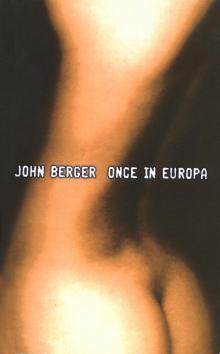 Once in Europa
Once in Europa To the Wedding
To the Wedding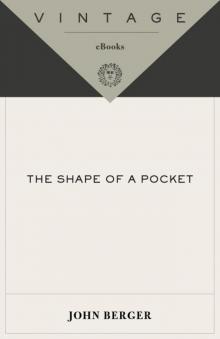 The Shape of a Pocket
The Shape of a Pocket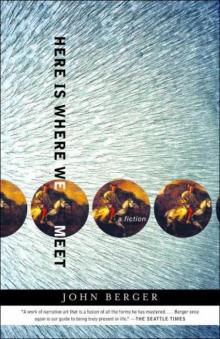 Here Is Where We Meet
Here Is Where We Meet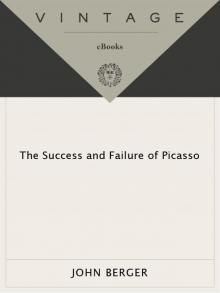 The Success and Failure of Picasso
The Success and Failure of Picasso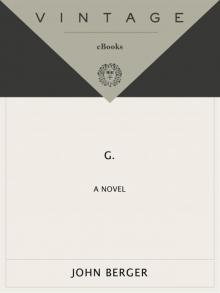 G.
G. Photocopies: Encounters
Photocopies: Encounters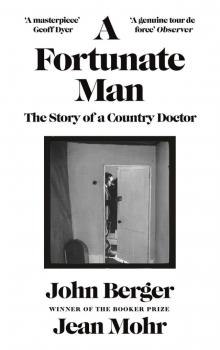 A Fortunate Man: The Story of a Country Doctor
A Fortunate Man: The Story of a Country Doctor And Our Faces, My Heart, Brief as Photos
And Our Faces, My Heart, Brief as Photos Titian
Titian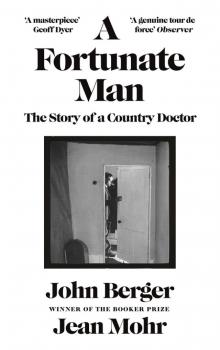 A Fortunate Man
A Fortunate Man Photocopies: Encounters (Vintage International)
Photocopies: Encounters (Vintage International) Selected Essays of John Berger
Selected Essays of John Berger